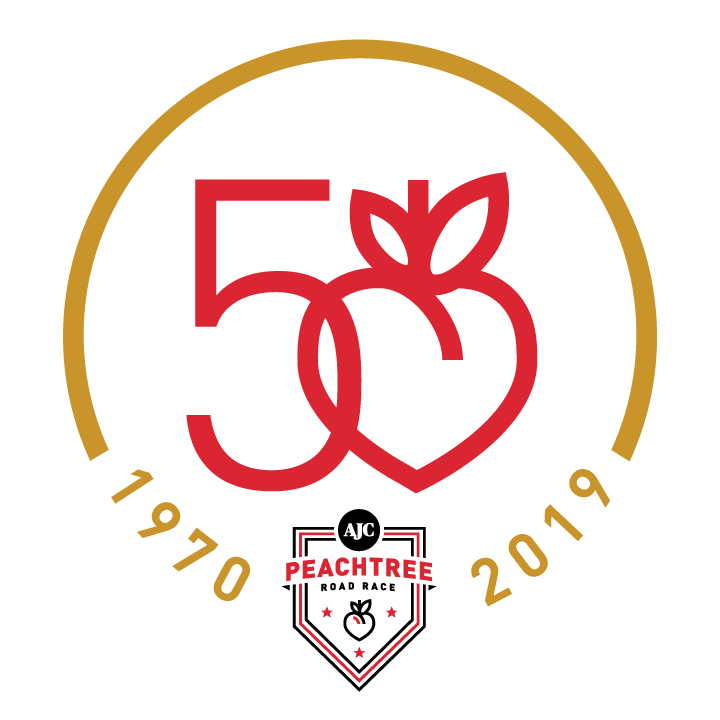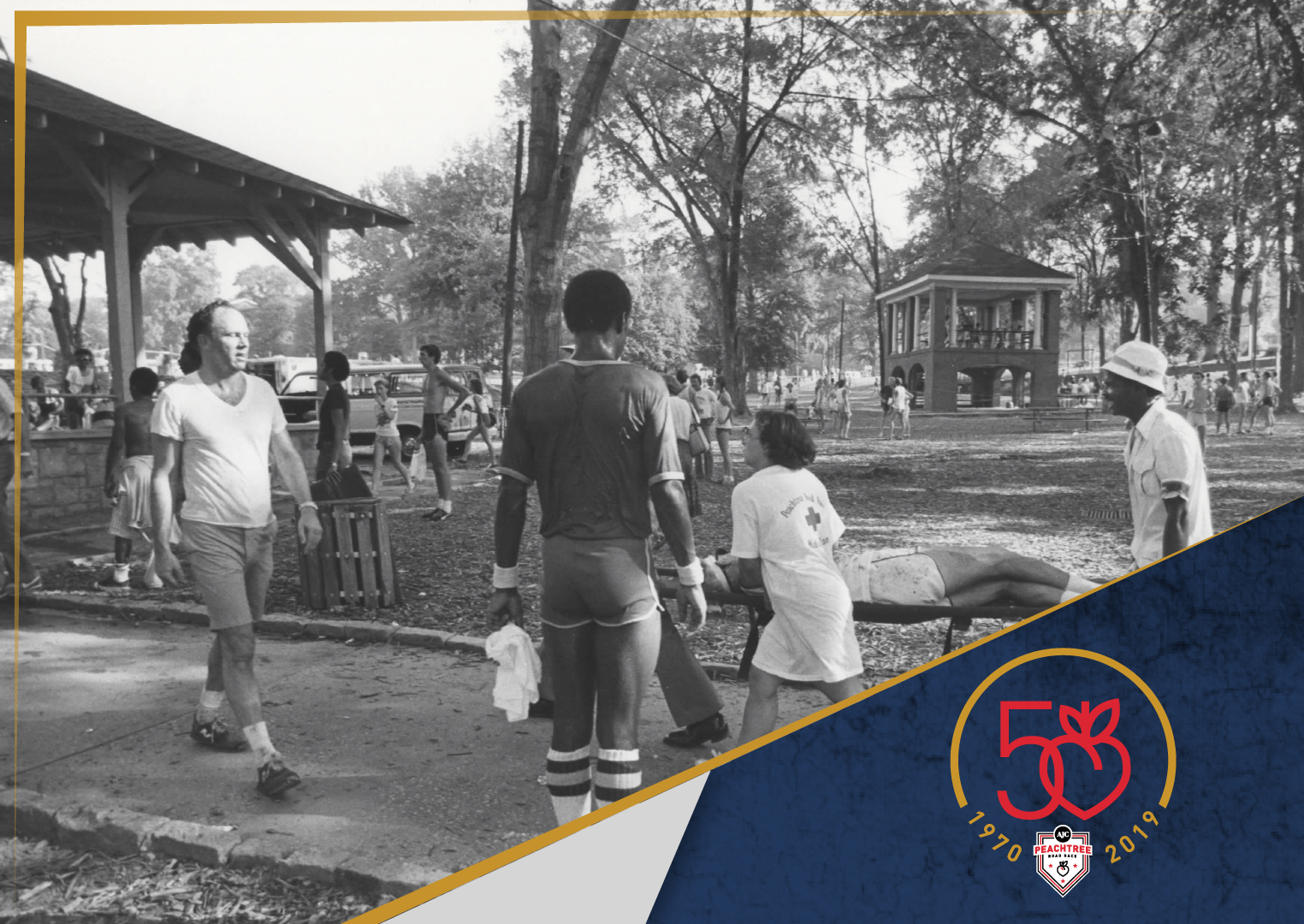A Birdseye View

Records show that more than 27,000 women finished the AJC Peachtree Road Race in 2018. At the inaugural running of Atlanta’s Fourth of July classic, in 1970, there were only three – at least one of whom wasn’t taking it too seriously.
50 years later, Maria Birdseye’s relationship with running would be considered serious by any measure: She hasn’t missed a day in more than four decades.
However, on July 4, 1970, she had no idea what she was getting herself into.
“My husband and I were driving, and the radio came on and said there would be a road race to celebrate the Fourth,” Birdseye recalled. “He was a runner, a quarter-miler who was fast, and he said, ‘We could try that.’ But I had never run six miles. I didn’t have a sense of how far that was.”
Road racing was in its infancy then, particularly for women. Only three years earlier, Kathrine Switzer had become the first woman to run the Boston Marathon as a numbered entrant. It was common for races to have dozens of men registered but only one or two women.
And so it was for Maria and Lew Birdseye as they joined a total of 150 runners for the start of the first Peachtree Road Race, in a Sears parking lot at Peachtree and Roswell roads. Entry fee: two bucks. Somewhere between 6 and 6½ miles later – the course had been measured imprecisely by a car’s odometer – 110 finishers arrived in Central City Park (now Woodruff Park).
Including the Birdseyes, now immortalized as part of the “Original 110.”
“We got downtown and I was two people ahead of him,” Maria said of Lew. “He said, ‘Wait a minute,’ and raced past me to the finish. He didn’t want to be beaten by a woman.” Maria finished 88th overall – ahead of 22 men, but not Lew. He was 87th.
To be fair, Lew had a 101-degree temperature at the start. However, on that day Maria ran twice as far as she had ever run before, and she hasn’t taken much of a pause since. At age 76, she is still faithfully putting one foot after the other, taking her health but not herself seriously.
On March 26 of this year, she celebrated a 41-year streak of running or walking at least one mile a day. Often she ran more than that, meaning that she’s covered the distance from Atlanta to Beijing and back – and maybe even back again.
The first half of the streak was mostly running, and the second half has been mostly walking. It’s still going, even with one of her arms in a sling from a recent broken wrist.
“Initially, it was a ruse to get my husband to watch the kids, just to have a little time to myself,” Birdseye said. In the early days, drivers occasionally would stop by the side of the road to ask if she needed help. That’s how uncommon it was to see a woman running alone.
The streak has survived at least half a dozen addresses in metro Atlanta and Birdseye’s career as an award-winning middle school science teacher. It has been extended on trips to far-off places such as Italy, France, Ireland, Greece, Canada, the Grand Canyon and Jackson Hole, Wyoming.
It kept going through a bout of strep throat and one occasion when Birdseye ran with sweats pulled over flannel pajamas.
“Too lazy to get dressed,” she explained.
It nearly ended in 1983, on the day the son of a close friend died.
“I was devastated and forgot about the streak,” Birdseye said. “Then I remembered at about 10 at night that I hadn’t run, so I went out and ran, crying the whole way.”
Perhaps most significantly, the streak has survived Parkinson’s disease, with which she was diagnosed nearly 10 years ago. In fact, her regular walking route in her Decatur neighborhood – limited to a mile or two for the past five years – has helped her manage the illness, according to Kirstin Darby, one of her two daughters.
“All the doctors say exercise is the best thing you can do [for Parkinson’s],” said Darby, who lives with her family near her mother. “And they say she’s in great shape.”
The streak also includes participation in the Olympic torch relay in 1996, when Atlanta hosted the Summer Games. Birdseye carried the torch for about three-eighths of a mile in the early morning hours near Stone Mountain – and hasn’t forgotten the experience, displaying her commemorative torch prominently in her home.
“I felt something I’ve never felt when the flame jumped over to me,” she said. “I had this electric shock of excitement. I felt uplifted, and I ran way faster than usual. I was elated.”
She also has held on to her four trophies from the Peachtree, for third place (1970), second (1971), fourth (1972) and fifth (1974). They are visually unremarkable, resembling something a child might receive for participating in a race at school, but priceless keepsakes nonetheless from an event she reveres like no other.
She estimated that she has participated in “probably half” of the 49 Peachtrees to date. Even when she wasn’t in the country for the Fourth of July, she was thinking Peachtree.
“One year, around 1985, my mom and dad were going to Europe and wanted to take me with them,” Birdseye said. “So there I was, on a steamer on the Rhine River in Germany, running six miles on the upper deck.”
The Peachtree became a family affair for Darby and her sister, Elisa Birdseye.
“I can’t tell you how many fond memories we have of driving with my aunt and grandmother down Peachtree next to the runners and waving at them from the back-seat windows,” Darby said. “We’d park at several spots along the way and get out and cheer on all the people we recognized, then zoom to the end and watch everyone finish.
“Our whole family loves what the race has become for Atlanta.”
And this Fourth of July? Maria Birdseye plans to be out on Peachtree with others from the “Original 110,” joined by family and friends from across the country for the historic 50th Running.
Lew Birdseye, though divorced from Maria for more than 30 years and living in Oregon, still runs at age 80 and might make it back for the occasion. Five years ago, the two of them walked the course together.
Who could have guessed it would go this way for 50 years? What if Maria and Lew hadn’t been listening to the car radio?
“My parents used to be crazy,” Darby said, “and now they’re cool.”







